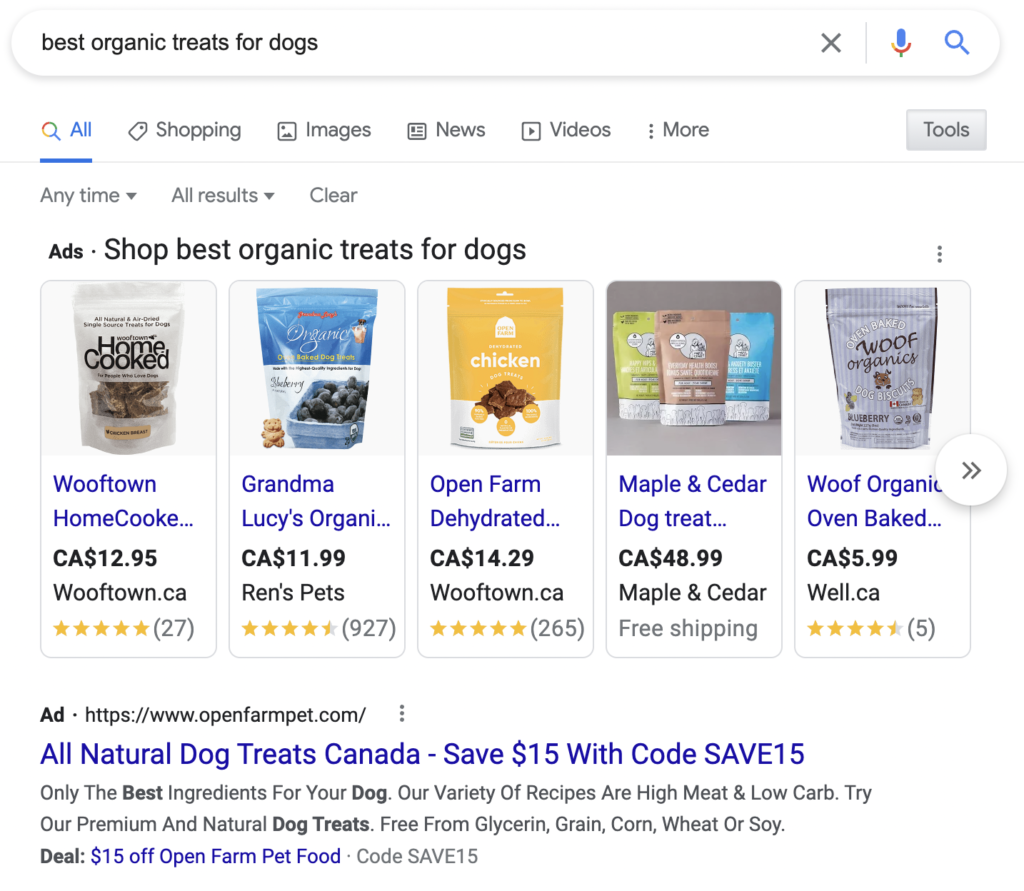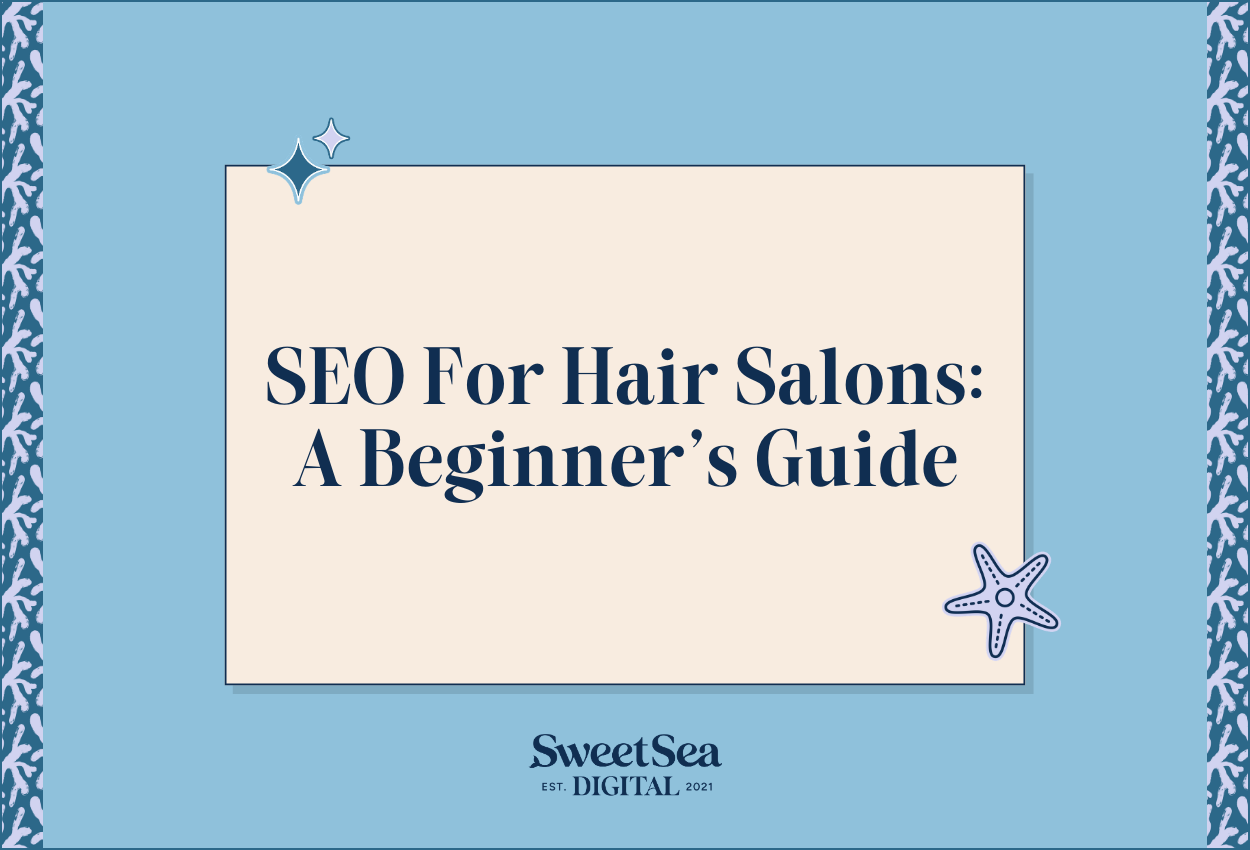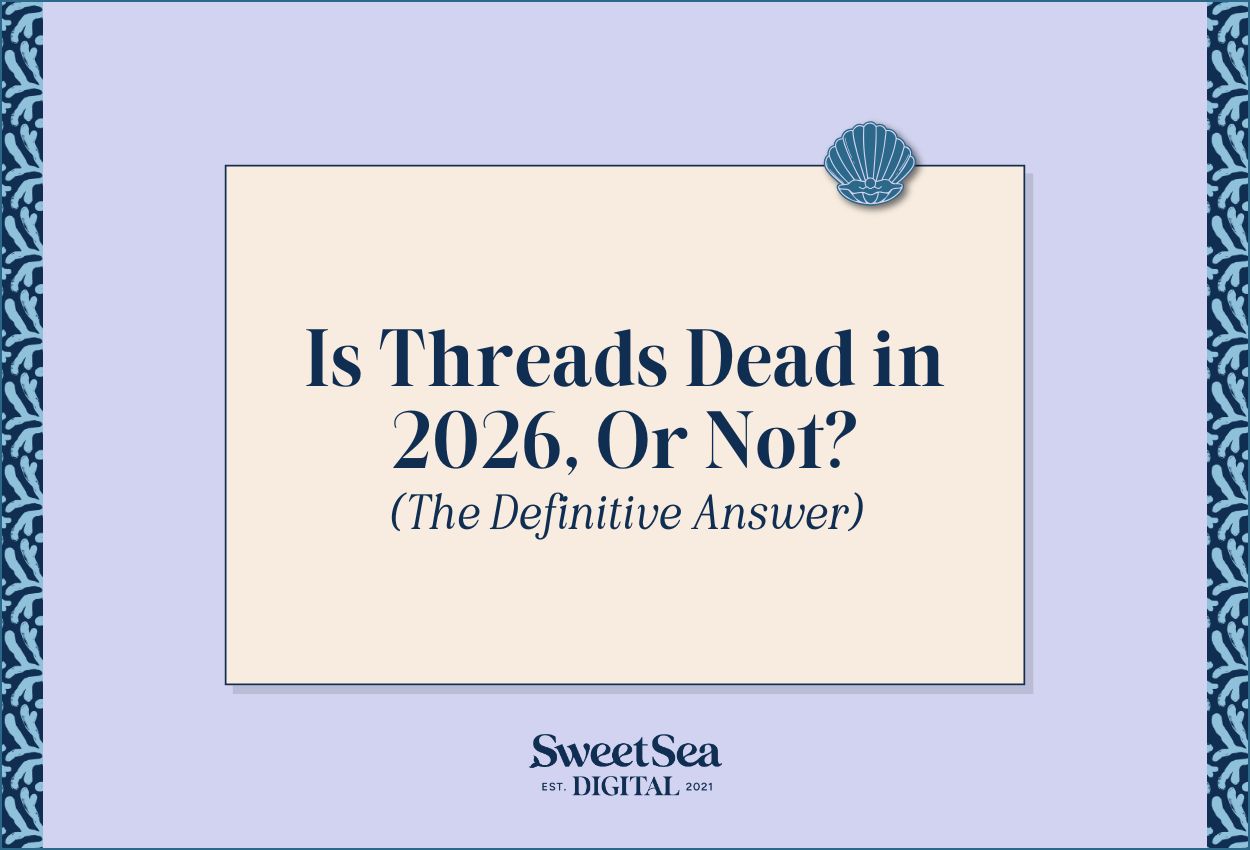SEO vs SEM: Differences (+ Which One is Right For Your Biz?)
By Seren Nurgun,
Founder of SweetSea Digital
By Seren Nurgun
Feb 9, 2024
Salt Your SEO:
Kickstart Your SEO With These 5 Easy Steps!
In all honesty, it depends! It’s impossible for either SEO or SEM to be better than the other in ALL scenarios and circumstances for ALL businesses. While SEO is generally considered a better long-term investment, SEM might be better suited for your current needs and goals.
SEO is better for businesses that already know their ideal clients and customers are searching for things related to the business, have time or resources to invest upfront, want to build their brand authority, don’t mind waiting a few months to see substantial results, and that are looking for a marketing channel that brings in passive traffic and income long-term.
SEM is better for businesses that know their ideal clients and customers are searching for things related to the business, they can outbid competitors to get valuable ad placements, have the time or resources to continually pay for ads (or a SEM Specialist), want immediate results and return on investment, and might want to test an offer quickly.
For businesses that don’t have their offers, marketing messaging, or positioning down yet, I wouldn’t recommend either SEO or SEM yet because those three things need to be clarified first.
If your business is at least one years old, has its business foundations solidified, and regularly makes sales, I’d recommend starting to invest in SEO because that’s the earliest it makes sense. Anytime before that, you’ll see slower results and you might end up having to edit a lot of blog posts if you decide to pivot before deciding on your business foundations.
The beauty of SEM is that you can start investing in it at any point in your business because your efforts don’t compound like they do with SEO. You can stop and start ads anytime you want! You can place an ad for any keyword you want for however long you want (as long as you can pay for it).
Just shows the nuance of SEO and SEM for businesses! There’s no one-size-fits-all.
Which is a better investment for your business?
In terms of an investment for your business, SEO will give you much more value over time than SEM would. It’ll continually bring in passive traffic and income for years if done right. Because blog posts have a long lifetime (can be years), they keep working for you on autopilot as people search for things using those keywords.
SEM will generate profits too (if done right), but the bad news is that your income stops when you stop paying for ads. So when you look at the investment for the long-term, SEO comes out on top. When you look at the investment for the short-term, SEM is a better choice.
What is search engine marketing (SEM)?
Search Engine Marketing (SEM) involves paying for ad placements within Google’s ad network (search network and display network). That includes PPC (pay-per-click) and display ads (the banners that show around a page’s main content). With PPC, you’ll typically see about 3-5 ads at the very top of Google and you can tell them apart from organic results by the little black Ads or Ad notifier beside the title of the page or beside a collection of ads (as seen in the example below). You also might hear people refer to SEM as PPC (pay-per-click) in some circles. Other circles claim SEM is an umbrella term that PPC, display ads, and SEO fall under.


PPC ads at the top of Google have an average click-through rate of almost 2%, meaning almost 2% of people who see the ads actually click on them. That’s not a bad click-through rate for ads in general. The average click-through rate for ads in Google’s display network is only 0.35%.
But something to note is they’re way lower than the average click-through rate of 28.5% for the first organic listing on a Google results page.
Everything comes with its pros and cons!
What are the pros and cons of SEM?
Pros
- Quick results
- Useful to test offers, landing pages, and sell through affiliate programs
- Can test different keywords and optimize your strategy for better ROI
Cons
- Costs money upfront to get the ads up and running
- When you shut off spending money, the results shut off too
- Click-through-rate is relatively low compared to other marketing channels like SEO
Is SEM the same as PPC?
It depends! To some, SEM means the same thing as PPC (paying for clicks). To others, SEM is an umbrella term that includes PPC, display ads, and SEO. The umbrella definition is the one I believe makes the most sense because PPC, display ads, and SEO are all ways to market your business through search engines.
Because people and companies have different definitions, it’s important to clarify exactly what people are talking about when they start talking about SEM! Especially if you’re looking into making a SEM-related investment for your business.
Is SEM the same as paid search?
No, paid search is just another name for PPC. It refers to paid ads at the top of Google result pages that appear after someone searches for something. I know, so many terms it’s hard to keep track! I promise there aren’t any new marketing terms for the rest of this blog post.
What is search engine optimization (SEO)?
Search engine optimization (SEO) is the art and science of improving websites so much that Google and other search engines reward them with a steady flow of targeted organic traffic, usually for years.
SEO only refers to the non-paid (aka organic) listings you see after you search for something on Google or another search engine. After about 3-5 sponsored ads at the top, you’ll see a continuous list of organic search results. Before 2021, you’d see 10 organic results but that changed when Google launched the continuous scroll (RIP the famous SEO joke “where’s the best place to hide a dead body? the second page of Google”).

SEO practices are divided up into 3 main areas:
- Technical: editing sitemaps and robots.txt files, optimizing images and videos, disavowing spammy links to your site, etc.
- On-Page: optimizing HTML headings, SEO titles, meta descriptions, linking to pages within your site and away from your site, etc.
- Off-Page: gaining backlinks (like little votes of confidence) from other websites to your website, digital PR, etc.
Within SEO, there are several specializations depending on the industry:
- International SEO (for multi-language websites)
- E-Commerce SEO (for online product-based businesses)
- Local SEO (for organizations with physical locations)
- Enterprise SEO (for organizations with hundreds/thousands of website pages)
- News SEO (for news publishers)
- SaaS SEO (for software-as-a-service businesses)
- Travel SEO (for businesses, organizations, and websites that are in the travel industry)
- Small Business SEO (for small businesses)
Important Note: If you’re learning about SEO yourself or are outsourcing it, make sure to look for resources that are specific to your industry! If you have a SaaS business and are learning about SEO for e-commerce, you won’t be learning the right SEO practices for your business. Sounds simple enough, but a lot of people don’t realize that SEO differs based on your type of business/website.
What is White-Hat vs Black-Hat SEO?
White-hat SEO is simply SEO practices that follow Google’s official guidelines.
Black-hat SEO is the opposite and involves going against Google’s official guidelines. Some black-hat SEO practices involve forum hacking, hiding keywords on a page, and setting up doorway pages (pages designed to rank for a keyword but don’t provide any value to the searcher). Black-hat tactics typically work great in the short-term, but eventually their benefits wear off and crash.
Using only white-hat SEO practices ensures you won’t wake up one morning and spit out your coffee when you see a big red penalty on your site put there by Google’s quality control.
Trust me when I say you DO NOT want any penalties against your site. They can make your SEO traffic free-fall, and it can be tough and time-consuming to recover.
What are the pros and cons of SEO?
Pros
- Upfront cost and then results passively and consistently compound over time
- Attracts qualified, interested people to you (instead of having to go out and cold pitch)
- Much higher click-through rate than PPC
Cons
- Results take time (about 3-8 months)
- Takes time to learn it yourself or takes money to outsource it
- Requires regular maintenance to stay ahead of competitors
Why is SEO more important than SEM?
SEO consistently builds your online reputation and presence in a big way by establishing authority and trust over time. SEM doesn’t do that.
That’s undeniably the biggest benefit of SEO because it leads to all the pros listed above. As Google and other search engines value your website more and more (through more high-quality content and/or more links from other sites), the algorithms reward it with more organic traffic and visibility.
If that fits into your business goals, we can help! Explore our quality SEO services, whether you have a 6 or 7-figure business or are more in the beginner stages.
What’s the main difference between SEM and SEO?
The main difference between SEM and SEO is you need to keep paying to keep the traffic flowing with SEM whereas you can stop pushing your SEO forward and you’ll still see traffic coming in for a long time. One is more short-term oriented, while the other is better for the long-term.
If you want to do your SEO completely free, you’ll learn a lot but you’ll end up paying with the lost opportunity to rank a lot faster and get found online sooner by potential clients and customers.
What are the main similarities between SEM and SEO?
Both SEM and SEO involve marketing through search engines like Google, Bing, DuckDuckGo, Yandex, and others. That means both are heavily reliant on finding the right keywords and optimizations that’ll beat out competitors and help you show up for those target keywords.
And neither SEM nor SEO can be done well without commitment and a full understanding of realistic expectations for both traffic and revenue growth. Commitment is important for SEM because (unless you’re experienced) you likely won’t make a profit from ads as soon as you start. As you learn, you’ll find better keywords and optimize as you go to really make it profitable and worthwhile. And it’s important for SEO because it takes months to see substantial growth, and if you quit early on you won’t see a big hockey stick curve.
Can you use both SEM and SEO together?
Yes, absolutely you can use SEO and SEM at the same time! In fact, if done right, it would skyrocket your reach through search engines. But just to be clear, they don’t benefit each other directly – meaning your SEO won’t improve just because you start buying ads and vice versa. And investing in one and not the other won’t harm your website in any way.
If you want to show up for important keywords that are competitive and you don’t organically rank for, buying ads might be a good idea to get extra visibility and clicks. That’s when investing in both SEO and SEM can be super beneficial. Or if you’re waiting on your SEO results to kick in, you can buy ads in the meantime to still get traffic to your website.
Important Note: If you ever stop investing in one, the other won’t be affected.
FAQ
Does SEO help SEM or vice versa?
No, SEO doesn’t directly affect SEM and SEM doesn’t directly affect SEO. They can complement each other or be used together strategically over time, but you’ll never be hurt by not investing in one or the other.
Is SEO free?
Yes, technically SEO is free to implement. But it’ll cost you money to outsource or it’ll cost you time and lost revenue to learn and implement it yourself.
Why is SEO paid upfront?
When outsourcing, SEO is usually paid upfront for a few different reasons. It takes a lot of work at the beginning of an SEO campaign to assess, audit, strategize, develop, and plan. And while you may be an amazing client to work with, there are many people out there who are happy to engage a service provider and then not pay for that work, leaving that service provider with nothing to show for all that time they spent. This happens more often than you might think so it’s very common these days for SEO to be paid for upfront.
If you’re feeling uneasy about paying upfront, ask your service provider if they’d be willing to accept a payment plan or 50% upfront, 50% when the work is completed. Always check their testimonials, background, and look for these critical things before hiring a SEO specialist!
Seren Nurgun
SEO pro and founder of SweetSea Digital, Seren has proudly generated over 278,000 organic clicks from Google and worked with awe-inspiring 6 and 7-figure business owners. Ethical, sustainable marketing is her jam.
Read These Next
Before you go any further…
Hi! I’m Seren, the writer!
Hi! I’m Seren, the writer!
An SEO pro since 2021, I’ve generated over 278,000 organic clicks from Google and worked with 6 and 7-figure business owners. Starting, running, and growing a business definitely isn’t the easiest thing you’ll ever do (to put it lightly), so this treasure trove of blog posts is purely focused on making your life that much easier. You’ve found one of my favorite places on the internet, so I won’t hold you any longer - happy reading!
But first!
Start your SEO journey on strong footing.
Benefit from the free Salt Your SEO guide, weekly newsletters with actionable tips, and some promotions you might not want to miss.
We’re not jerks! Your email will never be spammed, sold, or otherwise treated poorly.

FREE
GUIDE
A Boutique SEO Agency For Woman-Led Online & Local Businesses
A Boutique SEO Agency
For Woman-Led Online
& Local Businesses
who are ready to leverage the world’s
#1 search engine & make sales on repeat.
Navigate
Learn
Let's Connect
© 2021-2026 SWEETSEA DIGITAL, LLC
Brand Photography by Halle Alessia
SITE DESIGN BY CREATE & WANDER
Operating from the unceded ancestral homeland of the Tequesta people
Because we value your trust, we want to share that this page may contain unique affiliate links, which means that we may receive a financial exchange (at no cost to you) if you make a purchase. We only recommend the tools that we actually love and 100% ethically stand behind (because you deserve the best!).


